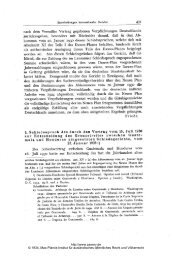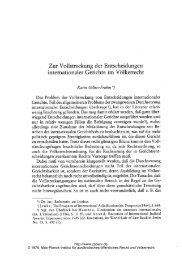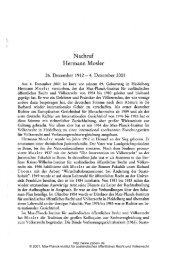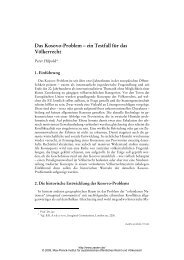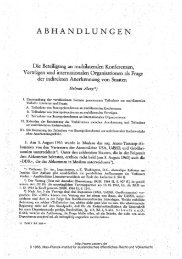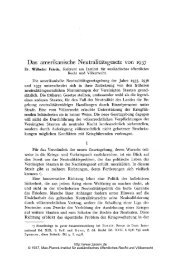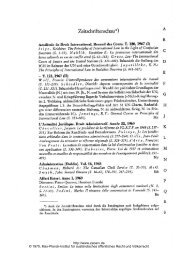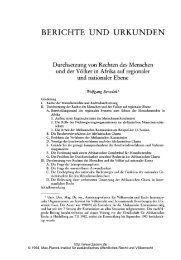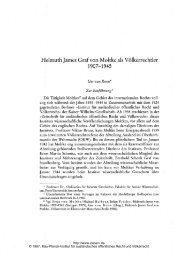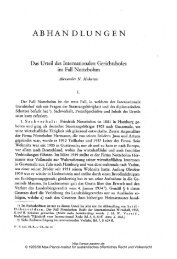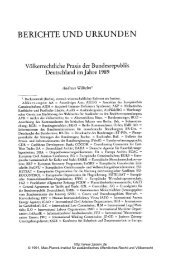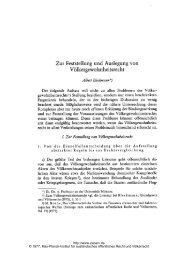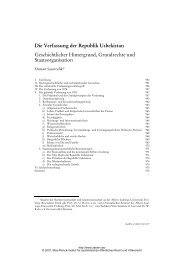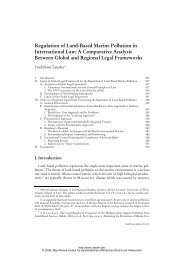bUe and Abuse of the Indian ConstitutionnD - Zeitschrift für ...
bUe and Abuse of the Indian ConstitutionnD - Zeitschrift für ...
bUe and Abuse of the Indian ConstitutionnD - Zeitschrift für ...
Create successful ePaper yourself
Turn your PDF publications into a flip-book with our unique Google optimized e-Paper software.
818 RaoOver <strong>the</strong> years, in pursuit <strong>of</strong> a welfare state, <strong>the</strong> role <strong>of</strong> <strong>the</strong> Executive has beenlater on.extended to practically every socio-economic activity, which in turn led to a greatvolume <strong>of</strong> legislation giving unprecedented power to <strong>the</strong> Executive. The higher judiciaryhas evolved principles <strong>of</strong> administrative law to restrain <strong>the</strong> Executive fromexercising its powers in an arbitrary <strong>and</strong> mala fide manner. One sees a wideninggap between what <strong>the</strong> courts proclaim in this regard <strong>and</strong> <strong>the</strong> actions <strong>of</strong> <strong>the</strong> Executive.Consequently, Government happens to be <strong>the</strong> major litigant before <strong>the</strong>courts. A lot <strong>of</strong> well-meaning actions are set aside, since Government fails to adhereto <strong>the</strong> principles <strong>of</strong> administrative law. judges at <strong>the</strong> highest level have alsoobserved that civil servants have been buck-passing <strong>and</strong> are disinclined to take decisionslest <strong>the</strong>y be blamed if <strong>the</strong> decision proved to be wrongCivil servants <strong>of</strong>ten complain <strong>of</strong> more unwarranted interference by <strong>the</strong> politicalexecutive at <strong>the</strong> State level than at <strong>the</strong> Central level, with <strong>the</strong> result that <strong>of</strong>ficers ondeputation from <strong>the</strong> State Government to <strong>the</strong> Central Government are generallyreluctant to go back to <strong>the</strong> State Government. Not infrequently, State Governmentsuse transfers as aweapon to victimise <strong>of</strong>ficers.With all its problems, <strong>the</strong> civil service in India is still a strong factor in sustaining<strong>the</strong> government at all levels. Though it developed <strong>and</strong> maintained license-per-in its h<strong>and</strong>s, -itmit Raj for over forty years <strong>and</strong> thus acquired enormous powersresponded well to <strong>the</strong> political call for dismantling this Raj to suit market-orientedeconomic reforms. The All India Services provide an effective <strong>and</strong> valuable linkbetween <strong>the</strong> Union <strong>and</strong> <strong>the</strong> State Governments.The civil service, especially its senior <strong>of</strong>ficers, is in need <strong>of</strong> adequate in-serviceexposure to general principles <strong>of</strong> administrative law <strong>and</strong> <strong>of</strong> constitutional law <strong>and</strong>specialisation in such areas as intellectual property rights, information technology,trade, commerce <strong>and</strong> finance, agriculture <strong>and</strong> environment, if it has to remain responsiveto <strong>the</strong> requirements <strong>of</strong> modern India.F. Execution <strong>of</strong> lawsThe Constitution does not create administrative agencies <strong>of</strong> <strong>the</strong> Union for <strong>the</strong>execution <strong>of</strong> itsin <strong>the</strong> Union List in <strong>the</strong> Sev-laws. Only a few subjects specifiedenth Schedule to <strong>the</strong> Constitution are administered by <strong>the</strong> Union directly throughown agencies.58 Administration <strong>of</strong> several matters in <strong>the</strong> Union List as alsoitsmost matters in <strong>the</strong> Concurrent List <strong>and</strong> enforcement <strong>of</strong> Union laws relating to<strong>the</strong>m are entrusted to <strong>the</strong> executive machinery <strong>of</strong> <strong>the</strong> State.59 The Constitutionmakers.considered that this arrangement is more economical <strong>and</strong> effective than <strong>the</strong>one obtaining in some federations in which <strong>the</strong> Union <strong>and</strong> States have separateagencies for administration <strong>of</strong> <strong>the</strong>ir respective laws. The Constitution expressly58E.g., Defence, Foreign Affairs, Foreign Exchange, Posts <strong>and</strong> Telegraphs, All India Radio <strong>and</strong>Television, Airways, Railways, Currency, Customs, Union Excise, Income-tax. For a discussion onthis aspect, see Report <strong>of</strong> Sarkaria Commission on-Central-State Relations, Part 1, 97 110.59 See articles 73 <strong>and</strong> 163 on <strong>the</strong> extent <strong>of</strong> executive power<strong>of</strong> <strong>the</strong> Union <strong>and</strong> <strong>of</strong> <strong>the</strong> States, respectively.See also article 258 on power <strong>of</strong> <strong>the</strong> Union to confer powers, etc.,on States in certain cases.http://www.zaoerv.de© 1998, Max-Planck-Institut für ausländisches öffentliches Recht und Völkerrecht



